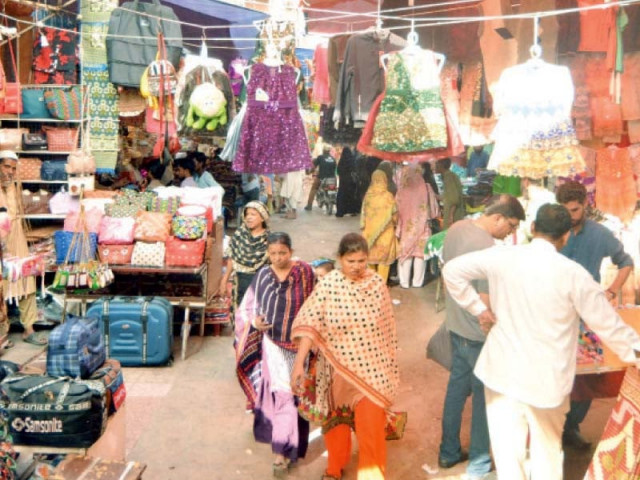Illegal bazaars hamper city traffic
Vendors allege they had to grease the palms of government officials to be allowed to operate

Close to the month of Ramazan it is common to see roadside bazaars, full of street hawkers and pushcarts, propping up on almost every other sidewalk in the city.
While these bazaars that offer a budget alternative to the public are known to experience heavy footfall throughout the month, they have also become a source of nuisance for the city’s pedestrians and cause severe traffic congestion along the busiest highways. It is believed that many such roadside businesses in Karachi have been set up without permission from relevant authorities and qualify for encroachment.
The Sindh government has disclosed that there is a district administration-led operation underway to remove all such encroachments from the city’s streets, that have shot up during the holy month.
However, the city’s population appears to have conflicting views on the matter. While some think that these stalls should be removed immediately to improve the megacity’s traffic situation, others see them as a means of livelihood for thousands of people and believe they should not be disrupted during the holy month.
Muhammad Nasir, who is a local welfare worker, is of the opinion that the last two years under the pandemic had been particularly difficult for many working-class people and small-scale traders, who had been hit with severe economic crisis due to loss of business. “This is the first time in two years that people are experiencing a return of business.
At the same time, the public is also keener to throng these bazaars now that there aren’t any coronavirus restrictions. Owing to this, wherever such bazaars are set up, the area experiences a degree of traffic congestion,” he explained.
On the other hand, Muhammad Saleem, who is a resident of the city, believes that such illegal markets, that have been widely set up in areas like Kharadar, Ranchhor Line, Jama Cloth, Saddar, MA Jinnah Road, Jahangir Road, Liaquatabad, Nazimabad, and Karimabad, are operated with some kind of mafia backing which has allowed them to remain in business despite government orders to uproot them.
“Karachi’s streets are riddled with such encroachments, which make it very difficult for people to commute during the month of Ramazan. Oftentimes, there is so much traffic that citizens are forced to break their fast on the road,” he complained. Asim, who is a vendor at one such roadside bazaar in Liaquatabad, alleged that although the stalls are considered illegal by the government, they have been allowed to operate after greasing the palms of government officials.
“Officials at various government institutions receive bribe money from stall owners, peddlers, and hawkers at every bazaar through their henchmen. Money collected from a roadside vendor ranges from Rs250 to Rs400. No roadside shop or stall can be erected without the alleged permission of these government agencies,” he claimed.
When probed regarding the matter, a spokesperson of the local traffic police said that they are collaborating with the district administration to remove all stalls deemed as encroachment from the city’s streets and sidewalks. Addressing the situation, Sindh Chief Minister’s Advisor Waqar Mehdi maintained that part of the traffic congestion is due to citizens freely shopping for Eidul Fitr, which had been a hampered activity during the past two years.
“However, the district administration is taking action to eliminate encroachments in the city. We take action whenever a complaint is received. Our goal is to keep the business going in the city and at the same time maintain the flow of traffic,” he told The Express Tribune.



















COMMENTS
Comments are moderated and generally will be posted if they are on-topic and not abusive.
For more information, please see our Comments FAQ